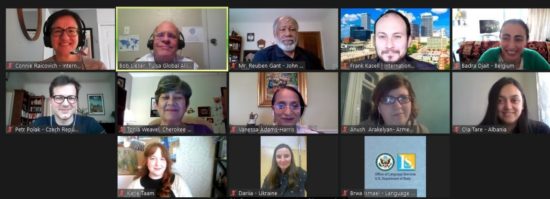By Bob Lieser, Vice President of Programs, Tulsa Global Alliance

An IVLP project on “Advancing Minority Rights” meets with representatives of the Cherokee Nation and the John Hope Franklin Center for Reconciliation. Photo provided by Tulsa Global Alliance
Many U.S. Department of State International Visitor Leadership Program (IVLP) participants who have visited Oklahoma have experienced our state’s diverse cultures, including Native American, African American, Hispanic, Southeast Asian, and Middle Eastern. A textbook on Oklahoma history from the 1980s was even called “Oklahoma – Blending of Many Cultures.”
Oklahoma has the second largest Native American population of any state in the nation, with 39 federally recognized tribes, many of which were forcibly relocated here during the Trail of Tears, the forced westward migration of Native American tribes from the South and Southeast in the 1830s. As a result, there are many agencies that focus on Native American issues and populations and various tribal museums and council offices within an hour’s drive from Tulsa.
Tulsa is also the home of the historic Greenwood District, known before the 1920s as the “Black Wall Street” and currently home to the Greenwood Cultural Center and Oklahoma Jazz Hall of Fame. Many Tulsa Global Alliance (TGA) IVLP participants have learned about the Trail of Tears and the 1921 Tulsa Race Massacre, as well as the resilience of diverse and distinct communities in Oklahoma.
In November of 2020, TGA hosted two museum managers from France through an IVLP project administered by Meridian International Center focused on “Building Relationships Between Native American Communities and French Museums.” The museum managers met with Tonia Weavel, Director of Education at the Cherokee Heritage Center, and Honor Keeler, Vice-President of the Cherokee National Historical Society, and asked them about a variety of topics, including the relationship between Native Americans and the U.S. Federal Government, preserving tribal language and culture, and repatriation of Native American cultural artifacts.
One of the museum officials commented that “The quality of the discussions, the depth of the debates, opened up new horizons for me in terms of legislation and, beyond that, ways of thinking about heritage that I had no idea about. It is a great opportunity to have been able to share with museum professionals, institutions and representatives of the nations. The diversity of their points of view and the concreteness of what they had to say really enriched me.” One of the museum officials was born in Amiens, which is one of Tulsa’s eight Sister Cities, and we hope that both of them will be able to visit Tulsa in person through the IVLP at a later date.
This month, Tulsa commemorated the centenary of the 1921 Tulsa Race Massacre, which destroyed Black Wall Street, a tragic event that many in the United States have only learned about in recent years. TGA has been fortunate to host two recent virtual IVLP projects with a specific interest in the 1921 Tulsa Race Massacre – eight Europeans focused on “Advancing Minority Rights,” organized in partnership with MCID Washington, and a multi-regional project for 22 participants interested in “Volunteerism and Civic Action,” hosted by Meridian International Center.
The European visitors met with Reuben Gant and Vanessa Adams-Harris, Executive Director and Director of Outreach and Alliances, respectively, at the John Hope Franklin Center for Reconciliation, an organization whose mission is to transform the bitterness and mistrust caused by years of racial division and violence, into a hopeful future of reconciliation and cooperation for Tulsa and the nation.
The group also met with Tonia Weavel from the Cherokee Nation. One of the visitors found the Cherokee component particular useful in learning about the definition of tribes in the United States, since tribe can be a derogatory term in Europe and North Africa. Another visitor was intrigued by the John Hope Franklin Center’s idea of hosting community dinners, and shared how that model could be useful back in her home country.
The Meridian International Center IVLP group met with Phil Armstrong, Project Manager for the Tulsa Race Massacre Centennial Commission, who spoke about the history of the 1921 race massacre, gave them a virtual tour of the new Greenwood Rising museum, and described the different roles that volunteers would play in the commemoration.
As Tulsans celebrate Juneteenth as a national holiday for the first time and prepare for a summer of in-person festivals and gatherings, TGA is grateful for the opportunity to share our diversity of cultures with the global community through the IVLP.
